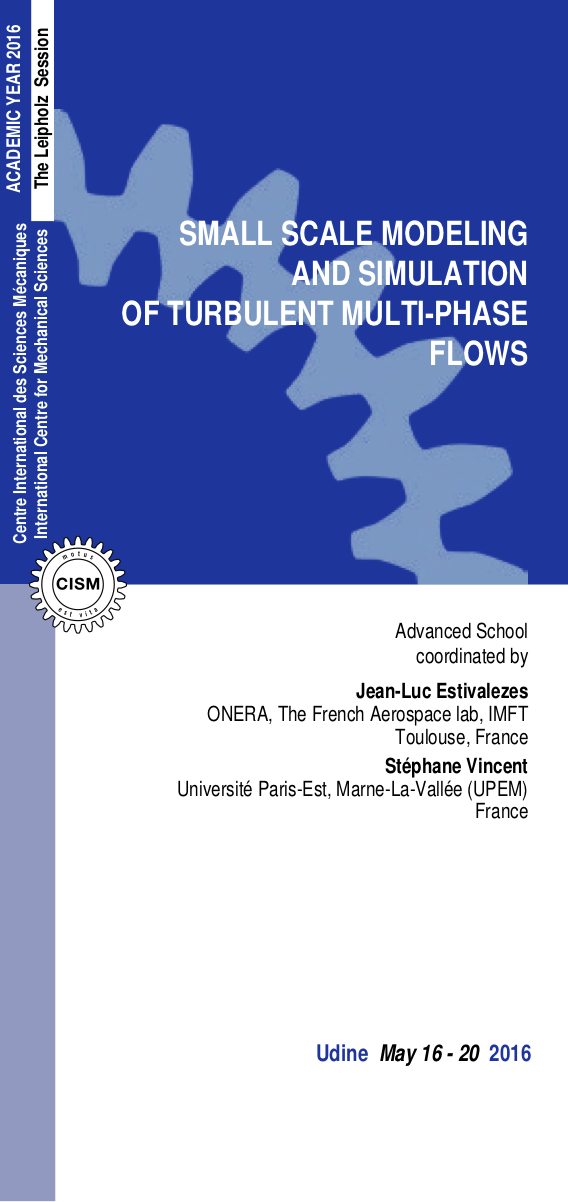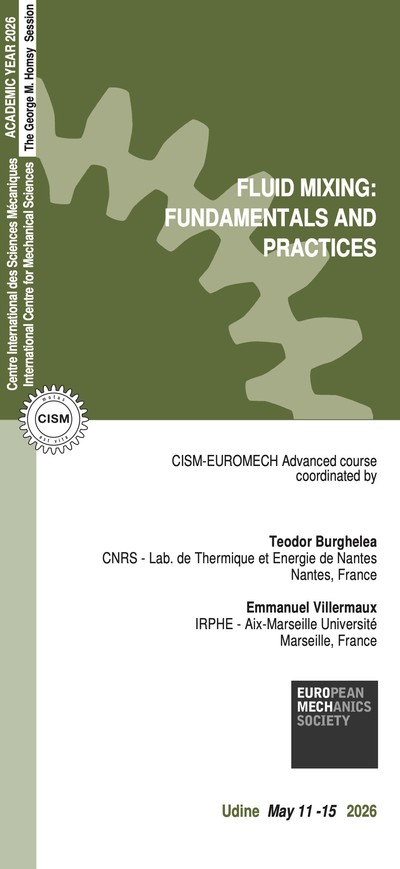The numerical simulation of multi-phase flows involving immiscible phases or solid particles generally considers the interaction between an ambient fluid and another phase (solid particles, droplets, bubbles, lms, sprays, jets). Either deformable grids, which are adapted to the interface, or fixed grids, with an independent representation of the interface, such as front-tracking, volume-of-fluid, level-set and phase-field, can be used to investigate these flows. The direct numerical simulation and large eddy simulation of multi-phase flows can be achieved with different mathematical models (Navier-Stokes, Boltzmann, Saint-Venant, Smooth-Particle Hydrodynamics) with emphasis on different physical aspects of the flow (representation of the capillary force with constant and variable surface tension, phase change, wettability and contact lines, and more complex phenomena involving electric and magnetic fields). Other topics of interest to the mechanical and CFD community are the multi-scale modeling of multi-phase flows. The present course aims at providing basis and recent research insights concerning the small scale modeling and simulation of turbulent multi-phase flows. By small scale, it has to be understood that the grid size for the simulation is smaller than most of the physical time and space scales of the problem. Small scale modeling of multi-phase flows is a very popular topic since the capabilities of massively parallel computers allows to go deeper into the comprehension and characterization of realistic flow configurations and at the same time, many environmental and industrial applications are concerned such as nuclear industry, material processing, chemical reactors, engine design, ocean dynamics, pollution and erosion in rivers or on beaches ... The main goal of this course is to propose a complete and exhaustive presentation of models and numerical methods devoted to small scale simulation of turbulent multi-phase flows from specialists of the research community. Attention has also been paid to promote illustrations and applications with senior researchers experts in CFD, multi-phase flows and collaborations with industry. The idea is also to bring together developers and users of different numerical approaches and codes to share their experience in the development and validation of the algorithms and discuss the difficulties and limitations of the different methods and their pros and cons. The focus will be mainly on fixed-grid methods, however adaptive and unstructured grids will be also partly broached, with the aim to compare and validate the different approaches and models.
Vincent S. and Sarthou A. and Caltagirone J.-P. and Sonilhac F. and Février P. and C. Mignot and Pianet G., Augmented Lagrangian and penalty methods for the simulation of two-phase flows interacting with moving solids. Application to hydroplaning flows interacting with real tire tread patterns, J. Comput. Phys., 230, pp. 956-983, 2011.
Sivaramakrishnan Balachandar (None)
7 lectures on:particle interacting with turbulence. Particle/turbulence interactions - Collisions - Resolved scale particles/Lagrangian/Eulerian modeling - Validations - Illustrations.
Jean-Luc Estivalèzes (None)
9 lectures on: massively parallel methods for deformable interfaces. History of interface tracking methods (except VOF) - Level Set -Ghost Fluid - High order nite volume schemes - Projection methods/AMR/parallel aspects - Eulerian/Lagrangian coupling for deformable interfaces - DNS of turbulence with deformable interfaces.
Djamel Lakehal (None)
6 lectures on:deformable interfaces interacting with turbulence. Interaction turbulence/interface - LES for interfaces – Validations - Illustrations.
Ruben Scardovelli (None)
6 lectures on: recent developments of VOF approaches for deformable interfaces. History and recent developments of VOF methods - Divergence free interpolations - Capillary effects/height functions – Validations - Illustrations.
Stéphane Vincent (None)
10 lectures on:fictitious domains for resolved scale multi-phase flows -fluide model - Fictitious domains - Augmented Lagrangian/ penalty methods/vectorial projection - Compressible (low-mach) two-phase ows – Validations - Applications.
The registration fee is of 575,00 Euro + VAT taxes*, where applicable (bank charges are not included). The registration fee includes a complimentary bag, four fixed menu buffet lunches (Friday subject to numbers), hot beverages, downloadable lecture notes and wi-fi internet access. Applicants must apply at least one month before the beginning of the course. Application forms should be sent on-line through our web site: http://www.cism.it or by post. A message of confirmation will be sent to accepted participants. If you need assistance for registration please contact our secretariat. Applicants may cancel their course registration and receive a full refund by notifying CISM Secretariat in writing (by email) no later than two weeks prior to the start of the course. If cancellation occurs less than two weeks prior to the start of the course, a Euro 50,00 handling fee will be charged. Incorrect payments are subject to Euro 50,00 handling fee. A limited number of participants from universities and research centres who are not supported by their own institutions can be offered board and/or lodging in a reasonably priced hotel or students' dormitories, if available. Requests should be sent to CISM Secretariat by
March 16, 2016along with the applicant's curriculum and a letter of recommendation by the head of the department or a supervisor confirming that the institute cannot provide funding. Preference will be given to applicants from countries that sponsor CISM. Information about travel and accommodation is available on our web site, or can be mailed upon request.
* Italian VAT is 22%.





